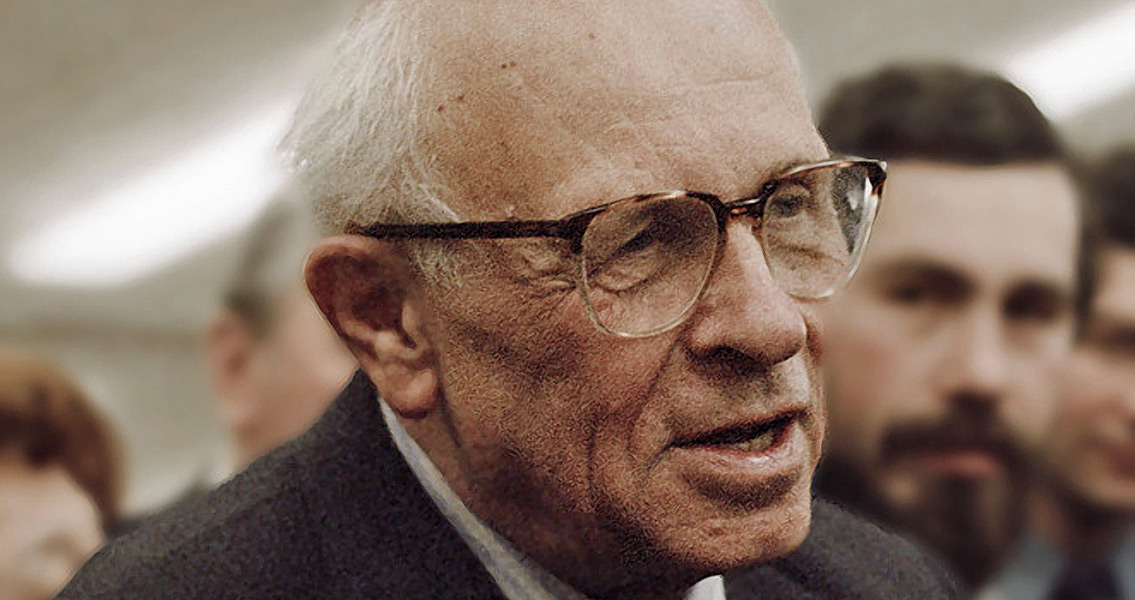<![CDATA[A Russian nuclear physicist, who was widely referred to as the father of the Soviet Hydrogen bomb, won the Nobel Peace Prize on 10th October, 1975. Andrei Sakharov, one of the USSR's most prominent nuclear scientists who played a crucial role in its atomic weapons program, went on to become a vocal advocate of human rights in his later years and a passionate campaigner against the dangerous nuclear arms race which erupted between the USA and USSR. His role, as a dissident in Soviet society, meant he was not granted permission to leave the country to receive his prize in Oslo. His wife, Jelena Bonner, instead traveled to accept the Nobel Peace Prize on his behalf. Born in Moscow in 1921, Sakharov was part of the first generation of children born and raised in the Soviet Union, with its ideals of communism and social equality. His father was a respected physics teacher, and author of textbooks and works on popular science. His grandmother, Maria Petrovna, had taught herself English and would read works by the likes of Charles Dickens, Harriet Beecher-Stowe and Christopher Marlowe, as well as Russian classics such as Pushkin, to the children - exposing them to ideas outside of the state sanctioned realist literature which had started to dominate Russian intellectual life in the years following the Revolution. In 1938 he enrolled in the physics department at Moscow University, where his exceptional aptitude at the subject was first discovered. During the Second World War he was exempt from military service and instead assigned to work in a munitions factory. News of the Hiroshima bombing fascinated Sakharov, and in 1948 he was recruited to the team of scientists tasked with developing nuclear weapons in Russia. By the late 1950s, following the first tests of Soviet hydrogen bombs, Sakharov became increasingly critical both of humanity's striving to improve its ability to wipe itself out, and the human rights record in the Soviet Union. In 1957 he wrote an article about the effects of low level radiation, arguing that the detonation of a one megaton bomb would result in 10,000 human casualties. In the article, he implored for the testing of nuclear weapons to stop, on the basis that it could save the lives of thousands of people. His concern at the repercussions of his own work, combined with the injustices he saw in Soviet society, increasingly pushed Sakharov to action, as he explained in his biography, "...I was becoming ever more conscious of the moral problems inherent in this work. In and after 1964 when I began to concern myself with the biological issues, and particularly from 1967 onwards, the extent of the problems over which I felt uneasy increased to such a point that in 1968 I felt a compelling urge to make my views public." In 1968 he wrote and released the article 'Progress, Peaceful Coexistence and Intellectual Freedom', which directly attacked the record of the Soviet Union, and argued for societies which were tolerant, democratic and free of dogmatism. A copy was smuggled to the United States, where it was published in the New York Times, and millions of copies of the work were distributed world wide. He was quickly fired from the weapons program in the wake of the article and increasingly devoted his time to advocating human rights. His public criticism of the Soviet invasion in Afghanistan proved the final straw, and in 1980 he was exiled to the isolated city of Gorky. Sakharov remained in exile until 1986, when Gorbachev came to power in the USSR and invited Sakharov to return to Moscow. The time spent in the isolated city, under continued persecution from the KGB, failed to extinguish Sakharov's passion for change. He persisted with his campaigning while in Gorky, and following the gradual liberalisation which took place under Gorbachev he became an elected member of the Congress of the People's Deputies. A man who had helped develop one of the most destructive weapons in history, before becoming one of the most celebrated advocates of human rights, Sakharov eventually passed away in 1989. On the anniversary of him winning the Nobel Peace Prize, it's interesting to note the parallels between Sakharov and Alfred Nobel - two men who made their name designing weapons before striving to have their legacy connected with human rights and peace rather than destruction, following the realisation of the devastation their work could cause.]]>
H-Bomb Designer Wins Nobel Peace Prize
